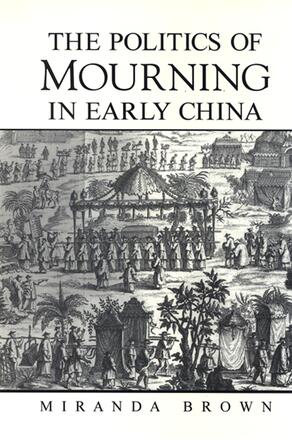
The Politics of Mourning in Early China
Alternative formats available from:
Looks at mourning practices during the Han dynasty to reassess whether filial piety was the overriding model for society and governance in early China.
Description
The Politics of Mourning in Early China reevaluates the longstanding assumptions about early imperial political culture. According to most explanations, filial piety served as the linchpin of the social and political order, as all political relations were a seamless extension of the relationship between father and son—a relationship that was hierarchical, paternalistic, and personal. Offering a new perspective on the mourning practices and funerary monuments of the Han dynasty, Miranda Brown asks whether the early imperial elite did in fact imagine political participation solely along the lines of the father-son relationship or whether there were alternative visions of political association. The early imperial elite held remarkably varied and contradictory beliefs about political life, and they had multiple templates and changing scripts for political action. This book documents and explains such diversity and variation and shows that the Han dynasty practice of mourning expressed many visions of political life, visions that left lasting legacies.
Miranda Brown is Assistant Professor of Asian Languages and Cultures at the University of Michigan at Ann Arbor. She is the coauthor (with Conrad Schirokauer) of A Brief History of Chinese Civilization, Second Edition.
Reviews
"Miranda Brown has produced a tidy study of the gendered nature of private and public space as expressed through mourning ritual during the Eastern Han period … It reveals a detailed look at the dynamics of Eastern Han society and asks questions that will force scholars to consider evidence from material or nontraditional sources more seriously." — China Review International
"Miranda Brown has written a scrupulous and convincing analysis of key themes in the cultural history of the Han Dynasty … Brown simply shows the crucial importance of gender to a host of Eastern Han values and practices." — Journal of the American Academy of Religion
"…a refreshing, loving book. The author is to be commended for focusing attention on the Eastern Han dynasty … The book should be savored, not only by scholars of early China, but also by those interested in Chinese social history more broadly." — Journal of Chinese Religions
"…a valuable addition to the literature on the important subject of filial piety in China." — American Historical Review
"Brown's book is a careful study that masterfully engages its sources: commemorative inscriptions of the Eastern Han dynasty. Not content to accept previous generalizations about these sources, she rereads them with a critical eye and shows that Eastern Han men had a much broader conception of political association and service than previously thought. By looking closely at Eastern Han epitaphs and not being beholden to any previous assumptions about them, Brown successfully throws doubt on many conventional explanations of these documents." — Keith Nathaniel Knapp, author of Selfless Offspring: Filial Children and Social Order in Medieval China